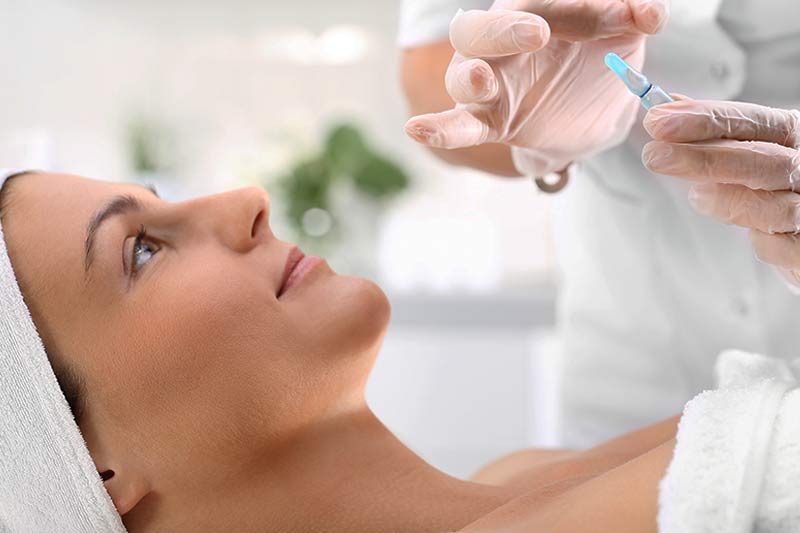Hyaluronic acid left the anonymity of medical books and gained fame as a staple ingredient in anti-aging skin care thanks to its impressive rejuvenating qualities. However, it is more than an ingredient in facial serums and creams. The FDA approved it for several indications, and it is being studied for more medical and cosmetic uses.
This article provides essential information on hyaluronic acid, how to use it, whether it is safe, and who can benefit from it.

What Is Hyaluronic Acid?
Hyaluronic acid is a polysaccharide (sugar compound) found in most vertebrates, some bacteria, and viruses. It is a gooey, sticky substance with a similar chemical structure across various organisms.
The majority of hyaluronic acid in today's skincare is a synthetic form of “hydrolyzed hyaluronic acid” or sometimes “sodium hyaluronate” (the salt derived from hyaluronic acid). They all go by the umbrella term “hyaluronic acid” or “HA,” which is used for all forms - natural, topical, and injectable.
Hyaluronic acid has the unique ability to bind and retain large concentrations of water molecules. It can hold up to 1,000 times its weight in water, providing intense hydration and volumization. It also has anti-inflammatory and antibacterial properties if used at the right molecular weight.
The functions of hyaluronic acid include:
- Hydrating the skin
- Lubricating joints and eyes
- Providing cushioning support between bones
- Reducing inflammation and oxidative stress
- Wound healing and tissue repair
- Supporting cell migration and blood vessel formation
Decreased production of hyaluronic acid due to aging, disease, and other factors can lead to health and cosmetic concerns, such as stiff joints, dry eyes, and wrinkles.
How Is Hyaluronic Acid Made?
Hyaluronic acid (HA) is naturally produced in the human body. Synthetic forms of HA for medical and cosmetic use are made in the lab, usually by fermenting the bacteria Streptococcus. Some forms of HA are synthesized from rooster combs.
What Is Hyaluronic Acid Used For?
Hyaluronic acid has various uses in medical and cosmetic settings.
1. Improves Skin Hydration
Half of our bodies’ hyaluronic acid is present in the skin. It is the key molecule in skin hydration. When concentrations are low, the skin becomes dehydrated, leading to the loss of elasticity, redness, wrinkles, and other aging signs. Topical hyaluronic acid and HA supplements enhance skin hydration, improving its barrier function, resilience, appearance, and overall health. However, it is important to note that HA needs to be at the right molecular weight to provide moisturizing effects.
2. Reduces Aging Signs
Hyaluronic acid is commonly used in cosmetic products to plump and smooth the skin. When used as a dermal filler, it can eliminate wrinkles, volumize sunken areas, and tighten and lift the skin.
3. Improves Aesthetic Concerns
Hyaluronic acid lip fillers are among the most popular non-surgical beauty treatments. They volumize the lips and give them a more sensual and moisturized appearance. HA fillers can also be used for other beauty enhancements, including plumping the sunken mid-face area, contouring the jawline, and reducing under-eye hollows.
Note: Read our blog post on the most common areas for dermal fillers.
4. Helps Heals Wounds
The anti-inflammatory, antibacterial, and moisturizing properties of hyaluronic acid make it an effective wound-healing aid. The compound draws fibroblasts to the wound to create more collagen, promotes new cell formation in the epidermis, and contributes to normal healing.
Creams and gels with HA are applied directly on the wound or skin ulcer.
5. Relieves Joint Pain

Decreased production of hyaluronic acid degrades cartilage, the connective tissue protecting joints and bones. The FDA has approved hyaluronic acid to relieve pain and stiffness caused by osteoarthritis (degenerative joint disease) of the knees. HA can also treat other painful joints, including the shoulders, ankles, and hips.
Patients receive hyaluronic acid injections directly in the joints, take oral HA supplements, or combine both treatments.
6. Relieves Dry Eyes
Hyaluronic acid is a natural component of eye tissues and tears, and a common ingredient in artificial tears, eye drops, and contact lenses. It helps lubricate dry eyes, protect them from harmful substances, and reduce friction during blinking. It can support and speed up recovery after ophthalmological surgeries – cataract removal, glaucoma treatment, corneal transplant, etc. Oral HA supplements can also prevent HA deficiency in the eyes.
7. Helps Treat Respiratory Diseases
Hyaluronic acid is present in the connective tissue of the lungs, regulating the balance of fluids and keeping the airways clear. Early research shows patients with asthma and chronic obstructive pulmonary disease may benefit from inhaling nebulized hyaluronic acid. This type of treatment is still being studied.
8. Helps Reduce Bladder pain
Doctors use hyaluronic acid in off-label procedures to help patients with the symptoms of bladder pain syndrome. The patients receive HA via a catheter to reduce pain and decrease urination frequency.
9. May Help Improve Cancer Therapy
When used as a nanocarrier in cancer therapy, hyaluronic acid can significantly improve the distribution of medications to cancer cells. It also reduces the drugs’ toxicity and mitigates the treatment’s side effects. Research is ongoing.
How to Use Hyaluronic Acid
The optimal way to use hyaluronic acid depends on the medical or cosmetic concern, the patient’s overall health, and the type of HA product. Hyaluronic acid is available in various formulations, including:
- Dermal fillers
- Injections
- Oral supplements
- Cosmetic products
- Eye drops
- Nasal sprays
- Inhaler/nebulizer fluids
Medical hyaluronic acid, including injections, supplements, nasal sprays, and eye drops, is used according to the doctor’s instructions.
Licensed medical providers use dermal fillers in med spas. The dosage and frequency of use depend on the patient’s unique aesthetic goals.
Hyaluronic acid in topical skincare products, such as cleansers, serums, and moisturizers, can be used daily – in the morning and evening. Some skin experts recommend using hyaluronic acid serums and creams on damp skin to enhance the results.
Note: Read our ultimate skincare guide to learn the basics of optimal skin care.
Benefits of Hyaluronic Acid

The cosmetic benefits of hyaluronic acid include:
- Increased hydration
- Reduced redness and irritation
- Less visible wrinkles
- Improved skin elasticity
- Plumper, smoother skin
The medical benefits of hyaluronic acid include:
- Reduced inflammation
- Improved wound healing
- Reduced eczema symptoms
- Decreased joint pain
- Improved bone health
- Increased joint mobility
- Relieved dry eye symptoms
Risks and Side Effects of Hyaluronic Acid
Topical hyaluronic acid is found to be safe and well-tolerated for most users. In rare cases, it may cause irritation. People with a history of severe allergies are more prone to a reaction. Always patch-test skincare products on a small area before starting their use.
HA hasn’t been tested on pregnant and nursing women, and skin experts advise avoiding it during this period.
Hyaluronic acid injections are more likely to cause side effects. Dermal fillers cause mild and temporary pain, redness, swelling, and bruising at the injection site.
HA injections for the joints may cause muscle pain, cramping, and swelling in the legs and arms.
Note: Learn more about dermal filler side effects and how to minimize them.
How Does Hyaluronic Acid Interact with Other Products?
Hyaluronic acid may cause a negative interaction with the following medications:
- Benzalkonium chloride topical
- Cetylpyridinium topical
- Furosemide
- NSAIDs
- Oral anticoagulants
In most cases, it doesn’t produce negative effects when combined with other drugs. However, it is important to disclose information about all medications and supplements you’re taking. Your medical provider may advise discontinuing certain medications before starting with hyaluronic acid.
Who Can Use Hyaluronic Acid?
Hyaluronic acid is generally safe and well tolerated. Anyone can use it topically. Even some creams for babies and children are formulated with hyaluronic acid.
Hyaluronic acid used in dermal fillers has only been studied and FDA approved in patients over the age of 21.
Doctors prescribe different forms of medical hyaluronic acid to patients depending on their health concerns.
Who Shouldn't Use Hyaluronic Acid?
The following conditions are contraindications for hyaluronic acid treatment:
- Pregnancy and breastfeeding
- History of bleeding disorders
- Severe allergies
- Scleroderma
- Liver and kidney disease
- Skin infections
- Infections in or around target joints
Hyaluronic Acid FAQ
Many people have questions about the effects of hyaluronic acid on the skin. Here we answer some of them.
Does Hyaluronic Acid Work?
Hyaluronic acid is proven to help with several medical and cosmetic issues thanks to its unique water-binding capacity. It intensely hydrates the skin, improving various aesthetic concerns.
Is Hyaluronic Acid Safe?
Hyaluronic acid is a naturally occurring ingredient in our bodies. It is well tolerated by most people and rarely causes adverse effects.
What Does Hyaluronic Acid Do for Skin?
Topical hyaluronic acid hydrates, plumps, and rejuvenates the skin, but consistent use is crucial in achieving noticeable results. HA dermal fillers instantly volumize the skin and lips and eliminate wrinkles.
Is Hyaluronic Acid Good for Acne?
Hyaluronic acid can help with acne as a secondary treatment. It supports first-line therapy by providing hydration to balance sebum production and mitigate the side effects of harsher medications.
Note: Learn more about what causes acne and how to avoid the most common acne triggers.
Is It Okay to Use Hyaluronic Acid Every Day?
Skincare products and supplements with hyaluronic acid are safe to use daily. Consistent use is more likely to lead to results.
Conclusion
Hydration is essential for the proper functioning of cells, tissues, joints, and skin, and hyaluronic acid is the key provider. Its unique ability to attract large concentrations of water makes it a valuable aid in many medical and cosmetic treatments.
Incorporate serums and creams with hyaluronic acid in your daily skin care to rejuvenate your complexion, and for more dramatic results, consider a hyaluronic acid filler treatment.
If you are in the Phoenix area, contact us and schedule a dermal filler treatment at Vibrant Skin Bar. Our seasoned skin experts will help you achieve the youthful look you desire!


